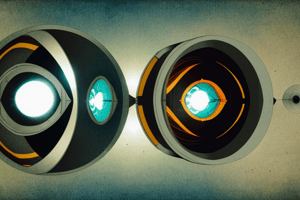Podcast
Questions and Answers
What condition directly leads to necrosis of myocardial cells?
What condition directly leads to necrosis of myocardial cells?
- Low cardiac output (correct)
- Systemic hypertension
- Arrhythmias
- Hypertrophy of myocardial muscle fibers
How does systemic or pulmonary hypertension affect the heart?
How does systemic or pulmonary hypertension affect the heart?
- Improves contractility
- Reduces myocardial workload
- Increases afterload (correct)
- Decreases cardiac output
What is the relationship between the extent of myocardial infarction and heart failure (HF)?
What is the relationship between the extent of myocardial infarction and heart failure (HF)?
- They are unrelated conditions.
- Mild infarction correlates with severe HF.
- The extent of infarction correlates with the severity of HF. (correct)
- Severe HF prevents myocardial infarction.
Which disease is specifically characterized as a disease of the myocardium that can lead to HF?
Which disease is specifically characterized as a disease of the myocardium that can lead to HF?
What effect does a compensatory mechanism in response to low cardiac output have on the heart?
What effect does a compensatory mechanism in response to low cardiac output have on the heart?
What is a potential cause of increased demand for oxygen in the body?
What is a potential cause of increased demand for oxygen in the body?
What does 'time is muscle' signify in the context of ischemia?
What does 'time is muscle' signify in the context of ischemia?
Which of the following symptoms is commonly associated with a cardiac event?
Which of the following symptoms is commonly associated with a cardiac event?
What physiological response may occur as a result of cellular injury during ischemia?
What physiological response may occur as a result of cellular injury during ischemia?
In addition to chest pain, which other symptom might indicate a cardiac concern?
In addition to chest pain, which other symptom might indicate a cardiac concern?
Where is the apical impulse typically palpated?
Where is the apical impulse typically palpated?
What is the function of baroreceptors in the cardiovascular system?
What is the function of baroreceptors in the cardiovascular system?
What do normal heart sounds S1 and S2 represent?
What do normal heart sounds S1 and S2 represent?
What condition does orthostatic hypotension describe?
What condition does orthostatic hypotension describe?
What is preload in the context of cardiac function?
What is preload in the context of cardiac function?
What is the primary role of the atrioventricular (AV) node in the heart?
What is the primary role of the atrioventricular (AV) node in the heart?
What does the term repolarization refer to in cardiac physiology?
What does the term repolarization refer to in cardiac physiology?
What is the purpose of cardiac catheterization?
What is the purpose of cardiac catheterization?
What is the primary cause of the second heart sound?
What is the primary cause of the second heart sound?
Which statement best describes contractility in the context of cardiac physiology?
Which statement best describes contractility in the context of cardiac physiology?
What does a cardiac stress test evaluate?
What does a cardiac stress test evaluate?
What is depolarization in the context of cardiac cells?
What is depolarization in the context of cardiac cells?
What characterizes systole in the cardiac cycle?
What characterizes systole in the cardiac cycle?
How is cardiac output defined?
How is cardiac output defined?
What does an abnormal heart sound detected early in diastole typically indicate?
What does an abnormal heart sound detected early in diastole typically indicate?
Which condition describes the disease of the heart muscle?
Which condition describes the disease of the heart muscle?
What is the primary purpose of Percutaneous Transluminal Coronary Angioplasty (PTCA)?
What is the primary purpose of Percutaneous Transluminal Coronary Angioplasty (PTCA)?
Which statement regarding coronary artery stents is correct?
Which statement regarding coronary artery stents is correct?
What is typically administered during the PCI procedure to monitor for complications?
What is typically administered during the PCI procedure to monitor for complications?
What is the recommended duration for clopidogrel use after stent placement?
What is the recommended duration for clopidogrel use after stent placement?
Which artery is preferred for grafting in CABG due to its lower likelihood of developing atherosclerotic changes?
Which artery is preferred for grafting in CABG due to its lower likelihood of developing atherosclerotic changes?
What condition is NOT an indication for PTCA?
What condition is NOT an indication for PTCA?
What is a potential risk associated with the placement of coronary artery stents?
What is a potential risk associated with the placement of coronary artery stents?
What type of anesthesia is typically used during a traditional coronary artery bypass graft (CABG)?
What type of anesthesia is typically used during a traditional coronary artery bypass graft (CABG)?
Flashcards are hidden until you start studying
Study Notes
Heart Muscle Injury and Heart Failure
- Low cardiac output triggers compensatory mechanisms, increasing heart workload and leading to heart filling resistance.
- Myocardial necrosis causes cell death and loss of contractility; the extent of infarction correlates with heart failure severity.
- Systemic or pulmonary hypertension raises afterload, increasing cardiac workload and resulting in myocardial hypertrophy.
- Cardiomyopathy, a disease of the myocardium, can lead to heart failure and arrhythmias.
Cardiac Anatomy and Function
- The apical impulse is the point of maximum impulse, felt at the fifth intercostal space along the left midclavicular line, due to left ventricle contraction.
- Normal heart sounds include S1 (closure of AV valves) and S2 (closure of semilunar valves).
Electrophysiology
- The atrioventricular (AV) node acts as a secondary pacemaker found in the right atrial wall near the tricuspid valve.
- Baroreceptors in the aortic arch and carotid arteries control blood pressure reflexively.
- Cardiac output measures the volume of blood pumped by each ventricle per minute.
- The cardiac conduction system coordinates electrical impulses essential for heart rhythm and function.
Cardiac Sounds and Pressure Dynamics
- S3 is an abnormal sound detected early in diastole often due to volume overload; S4 occurs late in diastole associated with resistance during atrial contraction.
- Preload is the stretch of cardiac muscle fibers at the end of diastole.
- Systole refers to ventricular contraction, resulting in blood ejection into the aorta and pulmonary artery.
Myocardial Ischemia and Infarction
- Increased oxygen demand can stem from rapid heart rate, thyrotoxicosis, or cocaine use.
- Infarction evolves over minutes to hours, leading to ischemia and cell death; urgency for treatment is captured in the phrase "time is muscle."
- Clinical symptoms include sudden chest pain unrelieved by rest, shortness of breath, nausea, anxiety, and cool, pale skin.
Coronary Interventions
- Percutaneous Transluminal Coronary Angioplasty (PTCA) uses a balloon-tipped catheter to open blocked coronary vessels, alleviating angina and acute coronary syndromes.
- A coronary artery stent, a metal mesh structure, supports vessels at risk of closure; it prevents heart attack and arrhythmias.
- Post-stent care requires antiplatelet medications, such as aspirin indefinitely and clopidogrel for one year.
Surgical Procedures and Recovery
- Traditional Coronary Artery Bypass Grafting (CABG) uses an internal mammary artery or the greater saphenous vein to bypass occluded coronary arteries.
- Endovascular vein harvesting minimizes infection and wound complications associated with vein grafting.
- Patients receive IV heparin or thrombin inhibitors during procedures and are monitored for bleeding risks postoperatively.
Studying That Suits You
Use AI to generate personalized quizzes and flashcards to suit your learning preferences.




